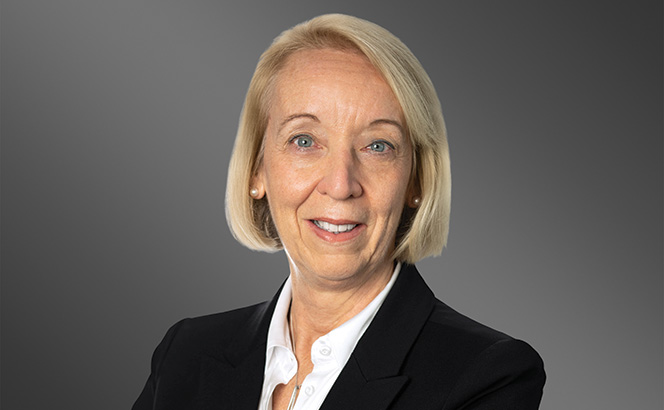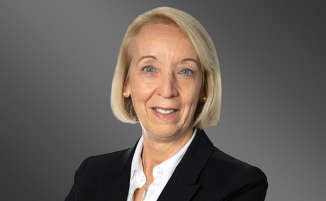From growing up in a Barnsley mining community to making the tea as a junior lawyer, Greenberg Traurig’s Kathryn Garbett reflects on a shifting landscape for women in law over her rise to City partner
Did you always want to become a lawyer?
I didn’t know anything about the legal profession. I was born and raised in a mining community in Barnsley. Everybody’s dad was a miner and the mums either stayed at home or had part-time jobs. I had never met a lawyer; I had only seen lawyers on TV. I remember [tv series] Petrocelli from my childhood but I never contemplated that was something I could do. The only professionals I met were my teachers, but I was put off the idea of becoming a teacher when I attended a poor state secondary school where the teachers had a hard time. The switch in my thinking came when I was about 17 – I had achieved good O level grades, and was attending sixth form, and the school provided us with prospectuses asking if anyone was interested in going to university. A boy in my A level Geography class, who was not as clever as I was (although the bar wasn’t that high), said he was going to study Law. I thought to myself if he can study Law, then surely I can too. I did some research to find out about the legal profession, went along to Barnsley library, and sat in on hearings at the local Magistrates court. I applied to university to study Law, but did I ever think I would actually go? It was an aspiration and something I thought I probably wouldn’t achieve, but I ended up getting a place and that was the turning point.
Tell us a bit about your path from a junior lawyer to a partner. Did being a woman make the journey to partnership more challenging?
I started my career as an article clerk. I secured articles with a high-street practice above a shop in North Finchley. There were about half a dozen lawyers who all did a mix of things. The firm wasn’t separated into departments or specialisms in the same way as larger firms. Two months into my articles, I saw a job advert in the Law Society Gazette (then the only legal magazine) for an articled clerk to transfer their articles to Birkbeck Montagu, a medium-sized firm in central London with a more traditional training set-up. I applied and got the position. This was a pivotal moment because I moved into a different league of training. I trained with a litigation team comprising five male partners, and they were great litigators who were great mentors. In those days, part of the training for an article clerk was to attend masters applications in court, and I enjoyed the thrill of being on the other side from other article clerks or junior counsel. It was as much about being streetwise as it was about having the better argument. At the end of my articles, the firm split when a number of the partners left to set up a new firm, so as a newly qualified solicitor I secured a position at a new firm as a defamation litigator. It was exciting time – I acted for authors, celebrities, politicians and well-known businessmen, including for Tom Bower in the litigation surrounding his unauthorised biography of Robert Maxwell. However, in 1991 Robert Maxwell died and the cases came to an abrupt end. I then saw an opportunity to move to a boutique white collar crime practice as the only dedicated civil litigator. After a year in the job, I was offered partnership. It was obviously a big step and not without risk; I was only three years qualified but I was young and enthusiastic. I worked extraordinarily hard to make sure I could justify my position. The fact that I was a woman didn’t really impact my journey to partnership in a small boutique practice.
Have you encountered any specific obstacles or biases in your legal career related to your gender?
There have definitely been times in my career when either I have been treated differently or encountered specific obstacles because I am a woman. In my early days as a junior solicitor, there were instances when, as the only woman in the room at client meetings, I would be asked to pour the tea or do the admin tasks. When the men in the meetings swore, they would apologise to me as ‘the lady in the room’. Then when I became pregnant with my first child and I could no longer be the person who was in the office 24/7 because I had another role, I was regarded differently, as if saying: ‘Can she still do the job she did before with a child?’. At that time, it was commonplace for women to leave the profession when they had children. For me other people’s doubts only got worse two years later when I had twins. It seemed like it was an expectation that I would leave the profession, but I loved my job, and I knew I could be a good mother and a good lawyer. However, it was difficult because there wasn’t a lot of support for women with children. If I was unable to attend a late evening meeting to pick up a child, I often felt like I was not up to the job, when that was far from the case. I also found when I looked upwards, there were few women who had been in my position to offer me any support.
Later, when I moved to a bigger firm, the gender imbalance in the profession became quite stark. It was clear there were a significant number of men at the top of the firm and very few women. When I first joined a bigger litigation team, I sat around a partnership table with 17 men. That’s when I realised that their banter, how they thought, what they said, and their empathy was just different to mine, and I often felt like an outlier. My importance in the room was diluted because they were all thinking the same way. But being northern did help because I was straightforward and had the ability to express myself. I’d say what I needed to starkly and not sit quietly back.
Do you think women need to develop thicker skin or exert twice as much effort compared to men in the industry?
One of the things I learned from sitting in that room was I need to make it my mission to get more women in the room. I had to develop a thicker skin to do that. I started to develop the very talented junior women around me. For women with children, I gave them an opportunity to come back to work in a way that would allow them the flexibility I had never had. I encouraged women to bring themselves to the table even though there might be obstacles, assuring them that I would be there to support them. I remember going to my appraisal with the department head, who said to me: ‘There is a perception that you only promote women’. I said to him: ‘There is also a perception that you only promote men.’ It just came out of my mouth before I could stop myself, and he looked shocked. But the truth was that my promoting women around me kept women in the profession who may have otherwise given up. Age and experience give you the confidence to stand up to someone dismissing you because you’re female.
Externally, have you ever noticed clients demonstrating a preference for having a male partner lead on their deal?
Not directly, although I have experienced some clients who have preferred to hear the same advice that I have given to them repeated by a male counsel or senior partner. However, although it happened to me on quite a few occasions when I was junior, it happens less frequently these days.
Have there been instances where you’ve felt compelled to overcompensate and go beyond your direct work responsibilities because of your gender, perhaps through considerations like what you wear?
Women talk about this a lot. The power dressing – putting on lipstick for an important meeting, or high heels so you’re just that bit taller. I’m one of the people who dresses smartly in the office all the time. I always felt that I had to look the part. To an extent that’s ingrained in me from a time when I was very junior. I remember when women couldn’t wear trousers in court, because the judge couldn’t ‘hear you’ but that changed in 1995. I was one of the first people in the office ever to wear a trouser suit, because I felt that it was something that I should do in order to show the junior women that they could do it too.
Since you began your career, have there been any significant developments for women in law?
Definitely. There have been really positive developments and that’s because there are more women moving into the upper layers of every part of the profession. It makes it better for women coming up through the ranks to have senior role models. I think that is important for their development and confidence. The firm I am in now has a female managing partner in London, gender diversity among our lawyers is close to 50/50, and we have one of the highest percentages of female equity partners and female partners of any major UK law firm.
The development of women’s networks has also been important. There are a lot of women’s networks now, but back in my day women didn’t network with their peers in the same way and as a result you didn’t know what women were thinking or experiencing. Women’s networks have opened up and improved the dialogue.
What advice do you have for aspiring young female lawyers who want to enter the profession?
First of all, please look upwards to find the women who are there to support you. There are lots of senior women in the profession who will help. Also, find somebody to support you amongst your peers, with whom you can share your experiences. You will feel like an imposter at times and you will get scared, so let them know what you are thinking. Once you have started to rise through the ranks and move up the ladder, remember to support those who are on the rungs below. That is how we will develop women in our profession. For me, I didn’t have the benefit from looking up, but I do have the opportunity to support the women coming behind me.













